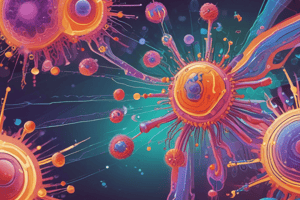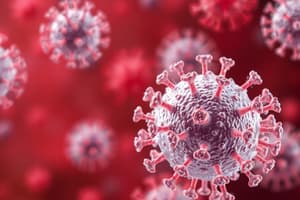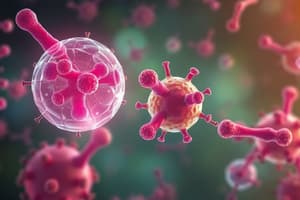Podcast
Questions and Answers
What is the primary function of antibodies in maintaining immunity?
What is the primary function of antibodies in maintaining immunity?
- To transport leucocytes to the site of infection.
- To directly destroy antigens through phagocytosis.
- To neutralize antigens, preventing them from causing harm. (correct)
- To stimulate the production of new antigens to enhance immune response.
Which components of blood directly contribute to maintaining immunity?
Which components of blood directly contribute to maintaining immunity?
- Plasma and erythrocytes.
- Platelets and leucocytes.
- Leucocytes and plasma. (correct)
- Erythrocytes and platelets.
What immunological process occurs during the two-week interval after the body's first exposure to an antigen?
What immunological process occurs during the two-week interval after the body's first exposure to an antigen?
- Intensive activity within the lymphoid tissue to produce antibodies. (correct)
- Antigen elimination by erythrocytes.
- Dormancy of the immune system to conserve energy.
- Immediate and high-level antibody production in the blood.
Why does the body mount a more rapid and pronounced immune response upon a second encounter with the same antigen?
Why does the body mount a more rapid and pronounced immune response upon a second encounter with the same antigen?
How does constant exposure to environmental antigens like pollen contribute to immunity over time?
How does constant exposure to environmental antigens like pollen contribute to immunity over time?
In what way do leucocytes contribute to the body's ability to resist disease?
In what way do leucocytes contribute to the body's ability to resist disease?
What distinguishes the secondary immune response from the primary immune response?
What distinguishes the secondary immune response from the primary immune response?
How do vaccines utilize the principles of immunity to protect individuals from diseases?
How do vaccines utilize the principles of immunity to protect individuals from diseases?
Why is maintaining a diverse set of antibodies important for long-term immunity?
Why is maintaining a diverse set of antibodies important for long-term immunity?
What is the specific role of lymphoid tissue (glands and spleen) in the immune response?
What is the specific role of lymphoid tissue (glands and spleen) in the immune response?
Which of the following conditions directly reflects a compromised or weakened immune system?
Which of the following conditions directly reflects a compromised or weakened immune system?
What implications does the presence of antibodies in the blood have for future encounters with the corresponding antigen?
What implications does the presence of antibodies in the blood have for future encounters with the corresponding antigen?
If an individual receives a vaccine for a specific viral infection, what component is being introduced to stimulate an immune response?
If an individual receives a vaccine for a specific viral infection, what component is being introduced to stimulate an immune response?
How does the role of plasma in transporting antibodies directly support the function of leucocytes during an immune response?
How does the role of plasma in transporting antibodies directly support the function of leucocytes during an immune response?
What would be the most likely outcome if a person's lymphoid tissue was severely damaged or removed?
What would be the most likely outcome if a person's lymphoid tissue was severely damaged or removed?
Why does the human body continuously encounter antigens throughout life, even in the absence of an active infection?
Why does the human body continuously encounter antigens throughout life, even in the absence of an active infection?
What underlying principle of immunology explains why a second dose of a vaccine (booster) is often more effective than the initial dose?
What underlying principle of immunology explains why a second dose of a vaccine (booster) is often more effective than the initial dose?
Which statement best describes how the interplay between antigens and antibodies contributes to adaptive immunity?
Which statement best describes how the interplay between antigens and antibodies contributes to adaptive immunity?
If a person has a genetic condition that impairs the function of their leucocytes, what is the most likely consequence?
If a person has a genetic condition that impairs the function of their leucocytes, what is the most likely consequence?
Flashcards
Immunity
Immunity
The body's ability to resist disease.
Blood's Role in Immunity
Blood's Role in Immunity
Blood maintains immunity via leucocytes and antibody transportation in plasma.
Antibody Production
Antibody Production
Lymphocytes and lymphoid tissue (glands and spleen) produce antibodies that neutralize antigens.
Antibody Response Time
Antibody Response Time
Signup and view all the flashcards
Building Immunity Over Time
Building Immunity Over Time
Signup and view all the flashcards
Study Notes
- Immunity is the body's capacity to resist disease.
- Leucocytes and antibodies in plasma contribute to immunity.
- Lymphocytes and lymphoid tissue produce specific antibodies when the body encounters an antigen.
- Antibodies neutralize antigens.
- After the first encounter, antibodies appear in the blood after about two weeks.
- Lymphoid tissue is very active during this period.
- Antibody concentration increases significantly after a second encounter with the same antigen.
- The human body builds up antibodies to naturally occurring antigens over time through exposure to airborne antigens such as pollen.
Studying That Suits You
Use AI to generate personalized quizzes and flashcards to suit your learning preferences.




